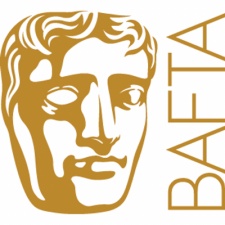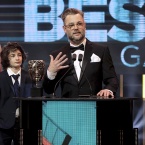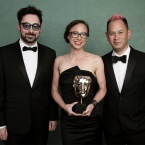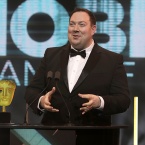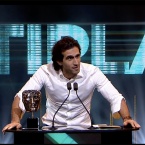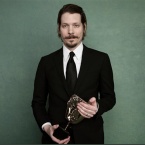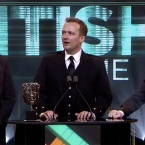Since its launch in April 2018, it feels like creative director Cory Barlog has been on a perpetual lap of honour, discussing how the game was made and the challenges therin. We caught up with the man himself to discuss his win in the Narrative category
Congratulations. How does it feel to win?
It's amazing and a little overwhelming. I was not prepared.
Really? You must have been ready to win something. God of War was down for nine categories.
Honestly, we haven't really won narrative awards that much.
Didn't you win Story and Character back in 2007?
For God of War 2 - yes! I didn't get to come. I didn't even have a passport at the time and Sony was like: 'Oh, that's fine, we have people out there that can take care of it'. I've always regretted not coming to the BAFTAs that first time that we won. It's exciting. It's an overwhelming experience.
What do you think God of War winning in the narrative category says about where the industry is right now?
We started to realise in the first few years of development was that our colleagues in other studios were making these games that are really interesting and challenging stories that are larger games - not just independent ones, which are always reaching, challenging and motivating us, to tell these interesting stories. To see triple-A titles starting to do this and to see people wanting that was exciting. It means that collectively, the desire for the why is there finally. We've always felt that game mechanics are great and an important part of games, but the why, what drives you through these experiences - especially when they're 40-to-80-hours long is super important.
For a while, the sign of maturity in video games storytelling was how 'cinematic' and film-like a narrative was, but it feels now that developers are starting to embrace what's possible in our medium and throwing off those shackles. Is that something you've noticed?
We've moved a little bit past the buzzwords, but we still attach them a little bit. You're right, a lot of times people said: 'It's a great narrative because it's so cinematic, it looks like a movie'.
And it was like 90 minutes of cutscenes with a bit of gameplay on either side.
Yeah. There are probably great stories inside of those experiences, but we've somewhat become shackled to this idea of in order to be a really interesting story, it has to feel like a movie. Even with the no-cut camera, that was an intentional thing to remove the verbs of film with cuts and say that we're going to do this on our own terms. We can do interactivity, we can do have a single camera shot over 40 hours - they can't really do that in a movie. We're going to embrace the fact that we have this ability to do it.
The original God of War games were a bit adolescent - a bit 'mature' with lots of violence and so on. Now it feels like it actually has matured. Why did you make that shift with this game?
We all grew up. The team and I all had more grey hair, we had kids, we look at things differently. We were sort of in our college years when we were making the original God of War - we were trying to thumb our nose at the industry, at Eastern developers who were saying that Western developers couldn't make great action games. We were like: 'Oh yeah? We can totally do that'. It was a fun rivalry challenge. Mature, at the time, meant being contrarian and edgy. It's interesting that, now, mature really is this sense of reflection and curiosity about our mistakes and our failures, and far less about the bravado.

